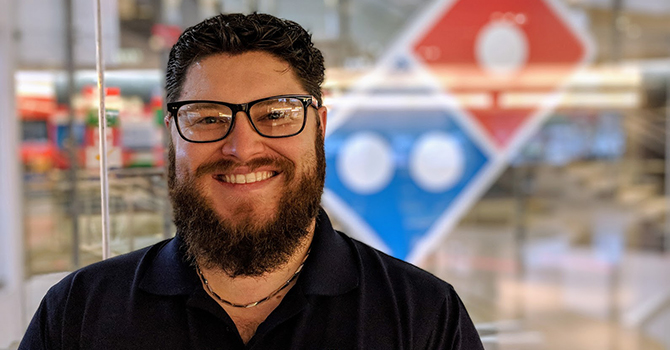Powering Pizza through Predictive Modeling

Kraig Stevenson
MS ‘09, PhD ’14, Biostatistics (Bioinformatics Degree through U-M Medical School); Predictive Analysis, Domino’s Pizza
“What I really wanted to do was problem solving,” Kraig Stevenson says about his career choices over the past decade. His love of developing techniques to answer data-related questions led him first to a masters in biostatistics, then a PhD in bioinformatics, and ultimately to an industry position at Domino’s headquarters in Ann Arbor.
While his subject matter has morphed over the years from biologics to the food industry, Kraig finds many similarities between his graduate experiences and current job in the way he uses data to answer challenging questions.
His work mainly consists of predictive modeling for a variety of business ventures. Partnering with Domino’s franchise development team, Kraig uses demographic and geospatial data to determine which store locations are likely to be successful. He also forecasts inventory usage, monitors feedback channels for customer satisfaction, and develops programs in SQL, R, and Python to analyze the large amount of data he handles.
“How you communicate what you did, how you did it, and what the results are — the importance of that cannot be overstated”
As project leader, Kraig is passionate about promoting software development at Domino’s. Instead of purchasing tools from outside developers, he wants to “encourage more of a culture around building things ourselves.” This emphasis empowers the pizza giant to tailor cutting-edge technologies and machine learning techniques to their specific needs.
Beyond simply knowing the technology, however, he must translate his vision effectively to collaborators outside of his department. “How you communicate what you did, how you did it, and what the results are — the importance of that cannot be overstated,” Kraig says. “That’s what I have to do every day.”
Educating colleagues about new technology is one of the main challenges in Kraig’s work. To help his collaborators understand the best way to conduct predictive analyses, Kraig finds himself drawing on the communication skills he learned while at Michigan.
"In grad school you spend a lot of time making presentations, talking to other people about what you did, and defending that,” he says. His ability to clearly explain the mechanisms and advantages of a new method is a crucial part of fostering a dynamic, successful work environment.
He’s always searching for new ideas to improve the company and stays informed of the latest developments by reading blogs, following Twitter feeds, and browsing relevant threads on Reddit. To maintain his work at the highest level, Kraig knows he needs to “keep up to date and keep sharp on the current state of data science.”
When Kraig initially transitioned from medical research to retail, he was worried that his new job would be unfulfilling. In his lab at graduate school, he loved the technical challenges and moral significance of health care research. But contrary to his expectations, Kraig finds great satisfaction in his work.
“What I want to do is build really cool tools and work with a lot of data, and Domino’s has the culture to make that possible," he says.
Kraig’s job is fast paced, self-directed, and challenging. “There aren’t really any dull moments,” he says. “The problems I’m working on are still super interesting even though they’re not health care problems.”
